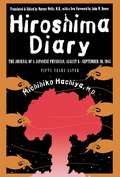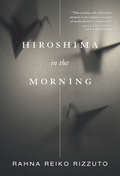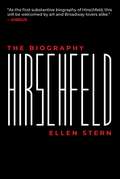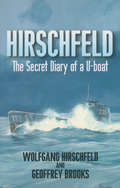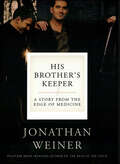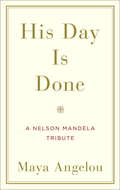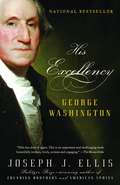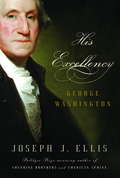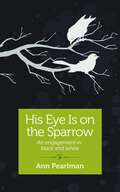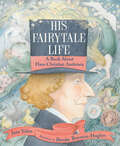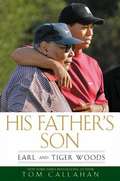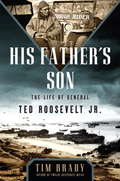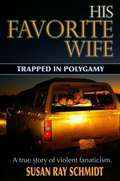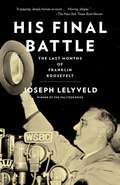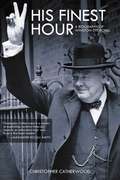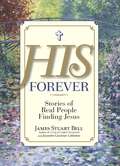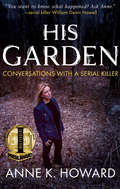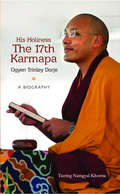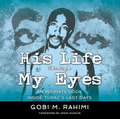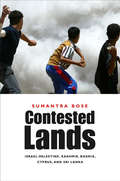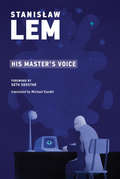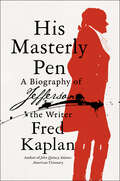- Table View
- List View
Hiroshima Diary
by Michihiko HachiyaThe late Dr. Michihiko Hachiya was director of the Hiroshima Communications Hospital when the world's first atomic bomb was dropped on the city. Though his responsibilities in the appalling chaos of a devastated city were awesome, he found time to record the story daily, with compassion and tenderness. His compelling diary was originally published by the UNC Press in 1955, with the help of Dr. Warner Wells of the University of North Carolina at Chapel Hill, who was a surgical consultant to the Atomic Bomb Casualty Commission and who became a friend of Dr. Hachiya. In a new foreword, John Dower reflects on the enduring importance of the diary fifty years after the bombing.
Hiroshima in the Morning
by Rahna Reiko RizzutoThe award–winning author of Shadow Child embarks on a simple journey to record history that changes her life as a wife and mother.In June 2001, Rahna Reiko Rizzuto went to Hiroshima, Japan, in search of a deeper understanding of her war-torn heritage. She planned to spend six months there, interviewing the few remaining survivors of the atomic bomb. A mother of two young boys, she was encouraged to go by her husband, who quickly became disenchanted by her absence.It is her first solo life adventure, immediately exhilarating for her, but her research starts off badly. Interviews with the hibakusha feel rehearsed, and the survivors reveal little beyond published accounts. Then the attacks on September 11 change everything. The survivors' carefully constructed memories are shattered, causing them to relive their agonizing experiences and to open up to Rizzuto in astonishing ways.Separated from family and country while the world seems to fall apart, Rizzuto's marriage begins to crumble as she wrestles with her ambivalence about being a wife and mother. Woven into the story of her own awakening are the stories of Hiroshima in the survivors' own words. The parallel narratives explore the role of memory in our lives and show how memory is not history but a story we tell ourselves to explain who we are.2010 FINALIST FOR THE NATIONAL BOOK CRITICS CIRCLE AWARD&“A brave compassionate, and heart-wrenching memoir, of one woman&’s quest to redeem the past while learning to live fully in the present.&”—Kate Moses, author of Wintering"This searing and redemptive memoir is an explosive account of motherhood reconstructed.&”—Ayelet Waldman, author of Red Hook Road
Hirschfeld: The Biography
by Ellen SternThe definitive biography of Al Hirschfeld, renowned caricaturist and artist. Al Hirschfeld knew everybody and drew everybody. He occupied the twentieth century, and illustrated it. Hirschfeld: The Biography is the first portrait of the renowned artist's life—as spirited and unique as his pen-and-ink drawings. Beginning in the 1920s, he caricatured Hollywood actors, Washington politicians, and—his favorite—celebrities of the stage. Broadway belonged to Hirschfeld. His work appeared in the New York Times and other publications, as well as on book jackets, album covers, posters, and postage stamps, for more than seventy-five years. He lived in Paris, Moscow, and Bali, and in a pink New York townhouse on a star-studded block where his closest friends—Carol Channing, S. J. Perelman, Gloria Vanderbilt, Brooks Atkinson, Elia Kazan, Marlene Dietrich, and William Saroyan—flocked in and out. He played the piano, went to jazz joints with Eugene O'Neill, and wrote a musical that bombed. He drove until he was ninety-eight years old and always found a parking space. He worked every day, threw dinner parties twice a week, and hosted New Year's Eve soirees that were legendary. He had three wives, a formidable agent, and a daughter, Nina, the most famous little girl that no one knows. Hirschfeld died in 2003, at the age of ninety-nine. "If you live long enough," he liked to say, "everything happens." For him, it did. And good and bad—it's all here. Through interviews with Hirschfeld himself, his friends and family (including the mysterious Nina), and his famous subjects, as well as through letters, scrapbooks, and home movies, Ellen Stern has crafted a delightful, detailed, and definitive portrait of Al Hirschfeld, one of our most beloved, and most influential, artists.
Hirschfeld: The Secret Diary of a U-Boat
by Geoffrey Brooks Wolfgang HirschfeldWhilst there have been many memoirs written by U-boat commanders of the Second World War, a book such as this, based upon the diaries of a senior Petty Officer telegraphist, written in 'real time' is something very special. Wolfgang Hirschfeld, whose diaries Geoffrey Brooks has translated is a born story teller. The principal chapters describe his experiences during six war patrols in U-109, in which he served as the senior telegraphist. His is a tale which covers the whole kaleidescope of emotions shared by men at war—a story of immense courage and fortitude, of remarkable comradeship born of the dangers, frustrations and privations shared and of transitory moments of triumph. Throughout runs a vein of humour, without which resistance to stress would have been virtually impossible. We get to know one of Germany's great U-boat aces, 'Ajax' Bleichrodt, holder of the Knight's Cross of the Iron Cross with Oak Leaves and, in a special biographical appendix, learn how he finally cracked under the strain. The role of Admiral Karl Donitz, the dynamic commander of the U-boat service, so fascinatingly described by Hirschfeld, is of special interest—not least because even this dedicated Nazi had clearly realized by September, 1942, that the war was fast being lost. In 1944 Hirschfeld was promoted Warrant Officer and found himself on a large, schnorkel-equipped boat (U-234) heading for Japan with a load of high technology equipment and, in addition, a quantity of uranium ore. The possible significance of that uranium has been deeply researched by Geoffrey Brooks and is discussed in a second appendix.
His Brother's Keeper: A Story from the Edge of Medicine
by Jonathan WeinerStephen Heywood was twenty-nine years old when he learned that he was dying of ALS -- Lou Gehrig's disease. Almost overnight his older brother, Jamie, turned himself into a genetic engineer in a quixotic race to cure the incurable. His Brother's Keeper is a powerful account of their story, as they travel together to the edge of medicine.The book brings home for all of us the hopes and fears of the new biology. In this dramatic and suspenseful narrative, Jonathan Weiner gives us a remarkable portrait of science and medicine today. We learn about gene therapy, stem cells, brain vaccines, and other novel treatments for such nerve-death diseases as ALS, Alzheimer's, and Parkinson's -- diseases that afflict millions, and touch the lives of many more."The Heywoods' story taught me many things about the nature of healing in the new millennium," Weiner writes. "They also taught me about what has not changed since the time of the ancients and may never change as long as there are human beings -- about what Lucretius calls 'the ever-living wound of love.'"This P.S. edition features an extra 16 pages of insights into the book, including author interviews, recommended reading, and more.
His Day Is Done: A Nelson Mandela Tribute
by Maya AngelouHe was a son of Africa who became father to a nation and, for billions of people around the world, a beacon of hope, courage, and perseverance in the face of opposition. Now, acclaimed poet Maya Angelou honors the life and remarkable soul of Nelson Mandela, former president of South Africa and Nobel laureate. In His Day is Done, Angelou delivers an authentically heartfelt and elegant tribute to Mandela, who stood as David to the mighty Goliath of Apartheid and who, after twenty-seven years of unjust imprisonment on the notorious Robben Island, emerged with &“His stupendous heart intact / His gargantuan will / Hale and hearty&” to lead his people into a new era. This poignant work of gratitude and remembrance offers condolences to the resilient people of South Africa on the loss of their beloved &“Madiba&” and celebrates a man like no other, whose life and work changed the world.Praise for His Day Is Done &“Moving and heartfelt.&”—The Washington Post &“A powerful, gripping tribute.&”—NewsOne &“[His Day Is Done captures] how many were feeling.&”—BBC News
His Excellency, George Washington
by Joseph J. EllisTo this landmark biography of our first president, Joseph J. Ellis brings the exacting scholarship, shrewd analysis, and lyric prose that have made him one of the premier historians of the Revolutionary era. Training his lens on a figure who sometimes seems as remote as his effigy on Mount Rushmore, Ellis assesses George Washington as a military and political leader and a man whose statue-like solidity concealed volcanic energies and emotions. Here is the impetuous young officer whose miraculous survival in combat half-convinced him that he could not be killed. Here is the free-spending landowner whose debts to English merchants instilled him with a prickly resentment of imperial power. We see the general who lost more battles than he won and the reluctant president who tried to float above the partisan feuding of his cabinet. His Excellency is a magnificent work, indispensable to an understanding not only of its subject but also of the nation he brought into being.
His Excellency: George Washington
by Joseph J. EllisNational BestsellerTo this landmark biography of our first president, Joseph J. Ellis brings the exacting scholarship, shrewd analysis, and lyric prose that have made him one of the premier historians of the Revolutionary era. Training his lens on a figure who sometimes seems as remote as his effigy on Mount Rushmore, Ellis assesses George Washington as a military and political leader and a man whose "statue-like solidity" concealed volcanic energies and emotions. Here is the impetuous young officer whose miraculous survival in combat half-convinced him that he could not be killed. Here is the free-spending landowner whose debts to English merchants instilled him with a prickly resentment of imperial power. We see the general who lost more battles than he won and the reluctant president who tried to float above the partisan feuding of his cabinet. His Excellency is a magnificent work, indispensable to an understanding not only of its subject but also of the nation he brought into being.From the Trade Paperback edition.
His Eye is on the Sparrow: An Engagement in Black and White
by Ann PearlmanOnce again, Ann Pearlman, author of Infidelity: a Love Story (nominated for a Pulitzer Prize and the National Book award, and the inspiration for a Lifetime movie) returns to memoir in His Eye Is On the Sparrow: An engagement in black and white. It&’s 1962 in the Midwest. The civil rights movement has just begun. Ann, who is Jewish, and Ty, who is black, are college students in love, and excited to meet each other&’s families. Along the way they encounter potentially violent, racially charged situations as their parents cope with their childrens&’ places in the forefront of changes yet to come. Ty and Ann learn about each other&’s community and family as they struggle with the realities of interracial relationship. And we, the readers, have a window into exactly how far we&’ve come in the last half century in America. Or have we?
His Fairytale Life: A Book About Hans Christian Andersen
by Jane YolenThe storyteller becomes the story in this illuminating biographical picture book of Hans Christian Andersen, father of the modern fairy tale.A century and a half have passed since Hans Christan Andersen&’s death, but his stories are more alive than ever. Across languages, borders, and disciplines, his timeless creations have left a footprint beyond measuring. Now, come along back to the beginning and meet the human that came before the legend. He was a boy who lived with a mother who could not read, but remembered every fairy tale she&’d been told…Appropriately penned by Jane Yolen, who Newsweek has called &“the Hans Christian Andersen of America,&” His Fairytale Life is as immersive and transporting as all good fairy tales should be. Each page sings with Brooke Boynton-Hughes&’s dazzlingly intricate illustrations. Classics lovers and Disney fanatics alike will cherish this dreamy tome.
His Father's Son
by Tom CallahanEver since he was a two-year-old golf prodigy, Eldrick ‘Tiger’ Woods has often been viewed less as a human being and more as a ball-striking machine – and his carefully guarded image and emotionless persona seemed to guarantee that it would remain that way. Even after his recent bombshell adultery scandal, the public still knows very little about the man behind the golf clubs and multimillion-dollar endorsement deals. But one thing is certain: Earl Woods, Tiger’s beloved and now deceased father, knew him better and influenced his life more than anyone. To know the father is to know the son. With unparalleled insight into the man who made Tiger Woods the person that he is, His Father’s Son is both a detailed biography and a touching story of an intense father-and-son relationship.
His Father's Son: The Life of General Ted Roosevelt, Jr.
by Tim BradyThe story of Theodore Roosevelt, Jr., a fortunate son who proved himself on the battlefields of two world wars.General Omar Bradley said of him, “I have never known a braver man or a more devoted soldier.” But for much of his life, Theodore Roosevelt’s son Ted seemed born to live in his father’s shadow. With the same wide smile, winning charm, and vigorous demeanor, Ted possessed limitless potential, with even the White House within his reach. In the First World War, Ted braved gunfire and gas attacks in France to lead his unit into battle. Yet even after returning home a hero, he was unable to meet the expectations of a public that wanted a man just like his father. A diplomat, writer, and man of great adventure, Ted remained frustrated by his lack of success in the world of politics, witnessing instead the rise of his cousin, Franklin, to the office that had once seemed his for the taking.Then, with World War II looming, Ted reenlisted. In his mid-fifties with a gimpy leg and a heart condition, he was well past his prime, but his insistence to be in the thick of combat proved a vital asset. Paired with the irascible Terry de la Mesa Allen Sr., Ted soon distinguished himself as a front-line general in a campaign that often brought him into conflict with another hard fighter, George Patton. On D-Day, Ted became the oldest soldier and the only general in the Allied forces to storm the beach in the first wave, hobbling across the sand with his cane in one hand and a pistol in the other. His valor and leadership on Utah Beach became the stuff of legends—and earned him the Medal of Honor.His Father's Son delves into the life of a man as courageous, colorful, and unwavering as any of the Roosevelt clan, and offers up a definitive portrait of one of America’s greatest military heroes.INCLUDES PHOTOSFrom the Hardcover edition.
His Favorite Wife: Trapped in Polygamy
by Susan SchmidtHis Favorite Wife-Trapped in Polygamy details my experiences as a young girl raised in a fundamentalist, polygamist sect, an offshoot of the Mormon Church. My story begins in 1968 in Colonia LeBaron, a small settlement in Chihuahua, Mexico. At fourteen I am considered of marriageable age and sought after by several of the brethren as a plural wife. I narrowly escape marriage to Ervil LeBaron, the charismatic patriarch of the church, whose revelations from God? pressure several of the women to become his wives, and ultimately, soldiers in his army. This story will appeal to a wide audience. Filled with rich, well-developed characters, it will grab the heart and imagination of the reader. His Favorite Wife will show how intelligent, educated people, in pursuit of the highest degree of glory, can be swept into a controversial lifestyle. With many tears and even with wide brush-strokes of humor, my book will lead the reader on a journey into a lifestyle that people wonder about and shudder about. It answers the question that I've heard countless times: How could you stand to share a husband? I couldn't do it!
His Final Battle: The Last Months of Franklin Roosevelt
by Joseph Lelyveld"By far the most enigmatic leading figure" of World War II. That's how the British military historian John Keegan described Franklin D. Roosevelt, who frequently left his contemporaries guessing, never more so than at the end of his life. Here, in a hugely insightful account, a prizewinning author and journalist untangles the narrative threads of Roosevelt's final months, showing how he juggled the strategic, political, and personal choices he faced as the war, his presidency, and his life raced in tandem to their climax. The story has been told piecemeal but never like this, with a close focus on Roosevelt himself and his hopes for a stable international order after the war, and how these led him into a prolonged courtship of Joseph Stalin, the Soviet dictator, involving secret, arduous journeys to Tehran and the Crimea. In between, as the war entered its final phase, came the thunderbolt of a dire medical diagnosis, raising urgent questions about the ability of the longest-serving president to stand for a fourth term at a time when he had little choice. Neither his family nor top figures in his administration were informed of his diagnosis, let alone the public or his closest ally, Winston Churchill. With D-Day looming, Roosevelt took a month off on a plantation in the south where he was examined daily by a navy cardiologist, then waited two more months before finally announcing, on the eve of his party's convention, that he'd be a candidate. A political grand master still, he manipulated the selection of a new running mate, with an eye to a possible succession, displaying some of his old vigor and wit in a winning campaign. With precision and compassion, Joseph Lelyveld examines the choices Roosevelt faced, shining new light on his state of mind, preoccupations, and motives, both as leader of the wartime alliance and in his personal life. Confronting his own mortality, Roosevelt operated in the belief that he had a duty to see the war through to the end, telling himself he could always resign if he found he couldn't carry on. Lelyveld delivers an incisive portrait of this deliberately inscrutable man, a consummate leader to the very last. From the Hardcover edition.
His Final Battle: The Last Months of Franklin Roosevelt
by Joseph LelyveldA New York Times 2016 Notable Book"By far the most enigmatic leading figure" of World War II. That's how the British military historian John Keegan described Franklin D. Roosevelt, who frequently left his contemporaries guessing, never more so than at the end of his life. Here, in a hugely insightful account, a prizewinning author and journalist untangles the narrative threads of Roosevelt's final months, showing how he juggled the strategic, political, and personal choices he faced as the war, his presidency, and his life raced in tandem to their climax. The story has been told piecemeal but never like this, with a close focus on Roosevelt himself and his hopes for a stable international order after the war, and how these led him into a prolonged courtship of Joseph Stalin, the Soviet dictator, involving secret, arduous journeys to Tehran and the Crimea. In between, as the war entered its final phase, came the thunderbolt of a dire medical diagnosis, raising urgent questions about the ability of the longest-serving president to stand for a fourth term at a time when he had little choice. Neither his family nor top figures in his administration were informed of his diagnosis, let alone the public or his closest ally, Winston Churchill. With D-Day looming, Roosevelt took a month off on a plantation in the south where he was examined daily by a navy cardiologist, then waited two more months before finally announcing, on the eve of his party's convention, that he'd be a candidate. A political grand master still, he manipulated the selection of a new running mate, with an eye to a possible succession, displaying some of his old vigor and wit in a winning campaign. With precision and compassion, Joseph Lelyveld examines the choices Roosevelt faced, shining new light on his state of mind, preoccupations, and motives, both as leader of the wartime alliance and in his personal life. Confronting his own mortality, Roosevelt operated in the belief that he had a duty to see the war through to the end, telling himself he could always resign if he found he couldn't carry on. Lelyveld delivers an incisive portrait of this deliberately inscrutable man, a consummate leader to the very last.
His Final Battle: The Last Months of Franklin Roosevelt
by Joseph LelyveldA New York Times 2016 Notable Book“By far the most enigmatic leading figure” of World War II. That’s how the British military historian John Keegan described Franklin D. Roosevelt, who frequently left his contemporaries guessing, never more so than at the end of his life. Here, in a hugely insightful account, a prizewinning author and journalist untangles the narrative threads of Roosevelt’s final months, showing how he juggled the strategic, political, and personal choices he faced as the war, his presidency, and his life raced in tandem to their climax. The story has been told piecemeal but never like this, with a close focus on Roosevelt himself and his hopes for a stable international order after the war, and how these led him into a prolonged courtship of Joseph Stalin, the Soviet dictator, involving secret, arduous journeys to Tehran and the Crimea. In between, as the war entered its final phase, came the thunderbolt of a dire medical diagnosis, raising urgent questions about the ability of the longest-serving president to stand for a fourth term at a time when he had little choice. Neither his family nor top figures in his administration were informed of his diagnosis, let alone the public or his closest ally, Winston Churchill. With D-Day looming, Roosevelt took a month off on a plantation in the south where he was examined daily by a navy cardiologist, then waited two more months before finally announcing, on the eve of his party’s convention, that he’d be a candidate. A political grand master still, he manipulated the selection of a new running mate, with an eye to a possible succession, displaying some of his old vigor and wit in a winning campaign. With precision and compassion, Joseph Lelyveld examines the choices Roosevelt faced, shining new light on his state of mind, preoccupations, and motives, both as leader of the wartime alliance and in his personal life. Confronting his own mortality, Roosevelt operated in the belief that he had a duty to see the war through to the end, telling himself he could always resign if he found he couldn’t carry on. Lelyveld delivers an incisive portrait of this deliberately inscrutable man, a consummate leader to the very last.
His Finest Hour: A Biography of Winston Churchill (Brief History Ser.)
by Christopher CatherwoodWho was Winston Churchill? Even fifty years after his death, he is one of the most iconic figures in British history. As a young man he was a maverick journalist; his many positions in politics before 1940 marked him as a courageous but foolhardy man. Yet it is Churchill’s record in war, which has recently been questioned, that confirms his genius as a military commander and national leader—someone who understood the dangers of Nazi Germany before 1939 and someone uniquely capable to lead the empire through the turmoil of the Second World War. Christopher Catherwood argues that it was Churchill’s stand in 1940-41 that saved Britain and that only he was able to bring together the allies that eventually defeated Hitler in 1945. Catherwood has produced a challenging yet lively reassessment of the life and career of Winston Churchill, lion of British history and flawed hero.
His Forever: Stories of Real People Finding Jesus
by James Stuart BellFor evangelical Christians, the experiences that bring them to accept Jesus as their personal Savior are among the most significant of their spiritual lives. In sharing these stories with one another they have become the touchstone of the Christian social experience. In His Forever, the first collection of such testimonials, ordinary men and women describe the extraordinary stories of their coming to Christ. This moving and inspiring anthology gives voice to the transforming power of the conversion experience for Christians everywhere--and the lasting effect of Jesus on their lives.
His Garden: Conversations with a Serial Killer
by Anne K. HowardA lawyer gets inside the mind of a notorious New England serial killer in this award-winning and &“grimly compelling&” true crime (Kirkus). For nine months of 2003, William Devin Howell went on a killing spree in and around New Britain, Connecticut. Seven people went missing; all of their bodies eventually discovered in a wooded lot behind a strip mall. But the investigation that led to Howell&’s arrest is only part of the story. Attorney and author Anne K. Howard first contacted Howell while he was serving a fifteen-year sentence for one of his murders. He was about to be charged for the remaining six. A unique and disturbing friendship between the two began, comprised of written correspondence, face-to-face prison visits and recorded phone calls. Over the course of years, Howell shared his troubled history with Howard. When his case was finally over, he told her every intimate, grizzly detail of how he became Connecticut&’s most prolific serial killer. In His Garden, Howard probes the complicated mind of William Devin Howell. It is a story that explores the eternal question of human evil and its impact on others, including the woman he chose to hear his horrific confession.2020 Independent Press Award2018 Literary Excellence Pencraft Award
His Hands His Tools, His Sex, His Dress: Lesbian Writers on their fathers
by Catherine Reid Holly K. IglesiasThis book strives to enter an often mirky world, of fathers and their lesbian daughters. Throughout this book of stories and poems, one can easily glimpse the love these talented young women have for their fathers, even if the fathers do not aprove of the daughters' lifestyles.
His Holiness The 17th Karmapa Ogyen Trinley Dorje: A Biography
by Tsering Namgyal KhortsaA fascinating and riveting life sketch of one of the most respected spiritual leaders of our times, which also delves deep into the various facets of Buddhism . . . The seventeenth Karmapa, Ogyen Trinley Dorje, is the leader of the Karma Kagyu School, one of the four main schools of Tibetan Buddhism. Born in 1985 in eastern Tibet to nomadic parents, he was recognized as the reincarnation of the sixteenth Karmapa who passed away in the US in 1981. He became the first Tibetan reincarnation to be recognized by both the Dalai Lama and the Chinese Government. The 15-year-old monk made headlines when he escaped to India in 2000. Currently living near Dharamshala (in Himachal Pradesh, India), the Karmapa is widely seen as an important spiritual leader of the twenty-first century. Over the past decade and a half, he has grown up into a formidable leader and an impressive orator. Behind the façade of scandals and controversies surrounding the Karmapa is an extraordinary young man, full of charisma and intelligence. Yet few know who the Karmapa is and what he believes in. What are his teachings and what is his vision for the world? How is he restoring his 900-year-old Tibetan Buddhist institution of which he is the head? In a unique mixture of biography, travelogue and reportage, the author brings alive the life of the Karmapa, who is grappling with immense challenges to modernize spirituality, while keeping its essence alive. Here is a timely volume that is highly relevant today given the worldwide attention on the developments in Tibet and its impact on Beijing.
His Life Through My Eyes
by Gobi M. RahimiGobi M. Rahimi spent Tupac Shakur's last eight months with him, serving as a co-producer and director for many of his music videos and short films. Along the way, he took behind-the-scenes photographs of Tupac in more relaxed, casual settings. Gobi's photos and words show a side of Tupac that is rarely seen, and humanizes a man who has since become a legend.
His Majesty’s Opponent: Subhas Chandra Bose and India's Struggle against Empire
by Sugata BoseThe man whom Indian nationalists perceived as the “George Washington of India” and who was President of the Indian National Congress in 1938–1939 is a legendary figure. Called Netaji (“leader”) by his countrymen, Subhas Chandra Bose struggled all his life to liberate his people from British rule and, in pursuit of that goal, raised and led the Indian National Army against Allied Forces during World War II. His patriotism, as Gandhi asserted, was second to none, but his actions aroused controversy in India and condemnation in the West. Now, in a definitive biography of the revered Indian nationalist, Sugata Bose deftly explores a charismatic personality whose public and private life encapsulated the contradictions of world history in the first half of the twentieth century. He brilliantly evokes Netaji’s formation in the intellectual milieu of Calcutta and Cambridge, probes his thoughts and relations during years of exile, and analyzes his ascent to the peak of nationalist politics. Amidst riveting accounts of imprisonment and travels, we glimpse the profundity of his struggle: to unite Hindu and Muslim, men and women, and diverse linguistic groups within a single independent Indian nation. Finally, an authoritative account of his untimely death in a plane crash will put to rest rumors about the fate of this “deathless hero.” This epic of a life larger than its legend is both intimate, based on family archives, and global in significance. His Majesty’s Opponent establishes Bose among the giants of Indian and world history.
His Master's Voice
by Stanislaw LemScientists attempt to decode what may be a message from intelligent beings in outer space. By pure chance, scientists detect a signal from space that may be communication from rational beings. How can people of Earth understand this message, knowing nothing about the senders—even whether or not they exist? Written as the memoir of a mathematician who participates in the government project (code name: His Master's Voice) attempting to decode what seems to be a message from outer space, this classic novel shows scientists grappling with fundamental questions about the nature of reality, the confines of knowledge, the limitations of the human mind, and the ethics of military-sponsored scientific research.
His Masterly Pen: A Biography of Jefferson the Writer
by Fred KaplanAs he did for Abraham Lincoln and John Quincy Adams, award-winning biographer Fred Kaplan offers a fresh, illuminating look at the life of Thomas Jefferson and his contributions as a writer.In this unique biography, Fred Kaplan emphasizes Thomas Jefferson’s genius with language and his ability to use the power of words to inspire and shape a nation. A man renowned for many talents, writing was one of the major activities of the statemen’s life, though much of his best, most influential writing—with the exception of the letters he wrote up to his death, numbering approximately 100,000—was done by 1789, when Jefferson was just forty-six. All of his works—from his earliest correspondence; his essays and proclamations, including A Summary View of British America, The Declaration of Independence, and Notes on the State of Virginia; his religious and scientific writings; his inaugural addresses; his addresses to Indian nations; and his exchanges with Washington, Madison, Hamilton, John and Abigail Adams, and dear friends such as Maria Cosway—demonstrate his remarkable intelligence, prescient wisdom, and literary flair and reveal the man in all his complex and controversial brilliance.In His Masterly Pen, readers will find a new appreciation of Jefferson as a whole, of his strengths and weaknesses, and particularly of the degree to which his writing skills—which James Madison admired as “the shining traces of his pen”—are key to his personality and public career. Though Jefferson could wield his pen with unrivaled power, he was also a master of using words to both reveal and conceal from others and himself the complications, the inconsistencies, and the contradictions between his principles and his policies, between his head and his heart, and between his optimistic view of human nature and the realities of his personal situation and the world he lived in.
